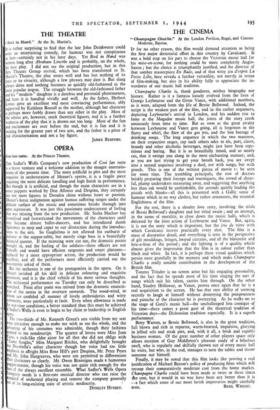THE CINEMA
1, Champagne Charlie." At the London Pavilion, Regal, and Cinema Moderne, Bayeux.
IF for no other reason, this film would demand attention as being the first major directorial effort in this country by Cavalcanti. It was a bold step on his part to choose the Victorian music hall for his mise-en-scene, for nothing could be more completely Anglo- Saxon ; but the choice is triumphantly justified, and the director of that sombre masterpiece En Rade, and of that witty jeu d'esprit La Petite Lilie, here reveals a further versatility, not merely in terms of film-making, but also in his ability fully to appreciate the in- wardness of our music hall tradition.
Champagne Charlie is, thank goodness, neither biography nor history. Rather is it a fantasia loosely evolved from the lives of George Leybourne and the Great Vance, with additional numbers, as it were, adapted from the life of Bessie Bellwood. Indeed, the script is the weakest part of the film, and in the earlier sequences, depicting Leybourne's arrival in London, and his sudden rise to fame at the Mogador music hall, the joints of the story creek ominously from time to time. But as soon as the great rivalry between Leybourne and Vance gets going, all is forgotten in the flurry and whirl, the flare of the gas jets, and the box barrage of drinking songs. The long sequence in which the two maestros, on their respective stages, cap each others odes to ale, port, claret, brandy and other alcoholic beverages, might just have been repe- titious and boring. But it is so beautifully timed, and so neatly cut, that it swings you along in the most enchanting manner; and, as you are just trying to get your breath back, you are swept into a second sequence involving a duel, not with songs, but with pistols. This is one of the wittiest pieces of movie t ) be seen for some time. The trembling principals, the row of doctors briskly preparing their forceps and tourniquets, the crowd of cheer- ful, plump undertakers measuring away, and suggesting that anything less than oak would be unthinkable, the seconds quietly loading the pistols with blanks—all this is presented with a Gallic sense of humour which in no way clashes, but rather ornaments, the essential Englishness of the film.
For the rest, there is a slender love story, involving the trials of Bessie Bellwood's daughter and her titled swain ; and an attempt, in the name of morality, to close down the music halls, which is defeated by the joint action of Leybourne and Vance. But, again, it is not the story which is important, but the joie de vivre with which Cavalcanti invests practically every shot. The film is a mass of decorative detail, and everything is seen in the perspective of gilt mouldings, fringes, looped curtains, and all the bijouterie and bric-a-brac of the period ; and the lighting is of a quality which almost gives the impression that the film is in colour rather than black and white. In fact, it is perhaps these visual qualities which persist most gratefully in the memory and which make Champagne Charlie a really notable contribution to the development of the British film.
Tommy Trinder is no screen actor but his engaging personality, and the fact that he spends most of his time singing the sort of songs which suit his talent, carries him through. On the other hand, Stanley Holloway, as Vance, proves once again that he is a real acquisition to the screen. He has that rare ability of seeming secretly to laugh at himself without destroying the pompousness and panache of the character he is portraying. As he walks on to the stage of Gatti's music hall—the unchallenged lion comique of his time—there comes a great gust of the theatrical tradition of Victorian days—the Dickensian tradition especially. It is a superb performance.
Betty Warren, as Bessie Bellwood, is also in the great tradition, full blown and rich in repartee, warm-hearted, impulsive, glorying in jellied eels and steak pies, and, with it all, a brisk and capable business woman. Of the great number of other players space only allows mention of Guy Middleton's pleasant study of a bibulous swell, who is regularly and skilfully thrown out of every music hall he visits, but who, in the end, manages to turn the tables and throw someone out himself.
Finally, it may be noted that this film looks like proving a real justification of Michael Balcon's policy of producing films which will recoup their comparatively moderate cost from the home market. Champagne Charlie could have been made at twice or three times *le cost, but if would in no way have been any better than it is --a fact which some of our more lavish impresarios might carefully


























 Previous page
Previous page